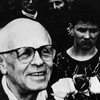Perestroika and Struggle for Democracy: 1987–1989
The dark clouds began to lift after Mikhail Gorbachev was elected General Secretary of the Communist Party in 1985 and initiated the process of reforms that would be called Perestroika (after the Russian word for “reconstruction”). But not until December 1986 was Sakharov allowed to return to Moscow and resume his public activities. He helped to initiate the first independent legal political organizations of the intelligentsia, and became one of the most prominent figures in the Soviet Union’s growing political opposition. The new groups demanded democratic changes more radical than the Communist Party’s official line of modest reform. In April 1989 Sakharov was elected a member of the Soviet Union’s new parliament, the All-Union Congress of People’s Deputies, and there he was elected a co-leader of the democratic opposition faction.
The democratic opposition demanded major concessions from the Communist Party, notably the abolition of the infamous Article 6 of the Constitution which proclaimed the party the ruling and guiding force of Soviet society. A principled defender of constitutional democracy, Sakharov started drafting a new Constitution. He argued that only quicker and more radical reform could guarantee the peaceful evolution of the country.
“The leaders of the first wave of perestroika... accepted as their own the system of values and the way of thinking of Andrei Dmitriyevich Sakharov... who was able to turn defenselessness into strength. He became a spiritual leader of all those who were trying to turn Russia into a democratic state. Their principle was the truth; their characteristic was straightforwardness; their method was a nonviolent way of forcing change; their spiritual climate was free of hate and thoughts of revenge.”
- Adam Michnik
On 14 December 1989, after a difficult day of discussions at the faction’s meeting, Sakharov died of a sudden heart attack. In early 1990, after massive political demonstrations in Moscow, the Communist party yielded to popular demand and gave up its constitutional monopoly on political power.




